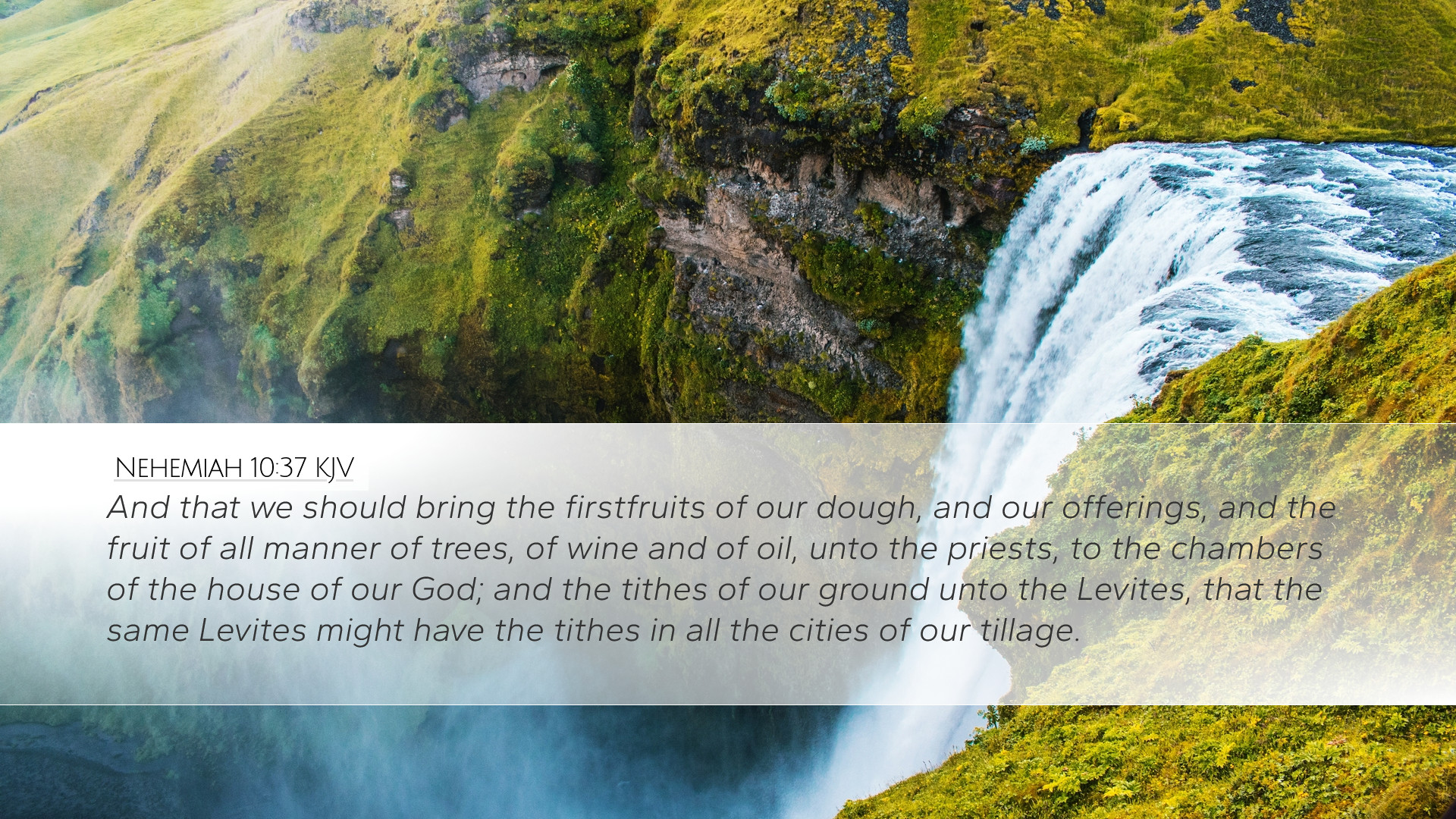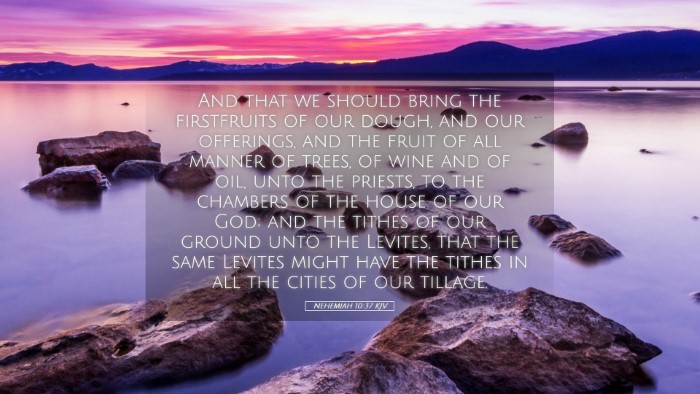Commentary on Nehemiah 10:37
Nehemiah 10:37 states:
"And that we should bring the firstfruits of our dough, and our offerings, and the fruit of all manner of trees, of wine and of oil, unto the priests, to the chambers of the house of our God; and the tithes of our ground unto the Levites, that the same Levites might have the tithes in all the cities of our tillage."
Contextual Overview
This verse is part of a covenant renewal ceremony wherein the returned exiles gathered to formalize their commitments to God’s law after the rebuilding of the Wall of Jerusalem. Nehemiah, as a reformer and leader, emphasized the importance of devotion and support to the religious institution, which objectively parallels the tangible contributions of resources.
Insight from Matthew Henry
Matthew Henry, in his esteemed commentary, highlights several key aspects related to this verse:
- The Principle of Firstfruits: Henry elaborates that the bringing of firstfruits signifies recognizing God as the Source of all blessings. This act not only acknowledges God's providence but also sets a spiritual prioritization in the believers' lives.
- Support to the Priests: The verse underscores the necessity of providing for the priests, suggesting that spiritual leaders require material support to effectively lead the community. Henry notes this as a continuation of the law that instructed the people to provide for the Levites.
- The Role of the Levites: By mentioning Levites, the text acknowledges their crucial function in the community as spiritual guides and caretakers of the worship practices. This passage reinforces the collaboration between the people and their religious leaders, which is fundamental to vibrant communal worship.
Albert Barnes' Perspective
Albert Barnes adds a further layer of interpretation on the practical implications of this verse:
- Covenant Commitment: Barnes emphasizes that this act of giving firstfruits and tithes is a form of covenant commitment—a public declaration of their dedication to God and His laws.
- Cultural Significance: He discusses the cultural backdrop that elevates this act beyond mere obligation; it is fundamental to community identity and religious fidelity.
- Order of Worship: Barnes elucidates that the organized system of offerings reflects an ordered worship, which contributes to the common good and blesses the community as a whole. It demonstrates how each member’s contribution plays a role in sustaining their collective spiritual life.
Contribution from Adam Clarke
Adam Clarke brings in a rich theological perspective, emphasizing the spiritual implications of the offerings described:
- Theological Implications of Offerings: Clarke suggests that offerings are not just financial transactions but symbolize a deeper allegiance to God. The act of giving is intertwined with the spiritual state of the giver.
- Symbolism of the Firstfruits: Through Clarke's lens, the firstfruits represent the best and the priority of one’s possessions being dedicated to God, encapsulating the essence of worship.
- Community Support: He further argues that recognizing the need to support priests and Levites in their duties falls within the broader scope of nurturing a spiritually vibrant society, which is essential for sustaining individual faith and communal worship.
Theological Reflections
The insights from these commentators converge into several theological reflections that are pertinent for pastors, students, theologians, and Bible scholars:
- The Nature of Offerings: The practice of offering firstfruits and tithes is a multifaceted expression of worship that blends gratitude, allegiance, and community responsibility.
- Spiritual Leadership: The support of spiritual leaders as mentioned reinforces that a community must care for its spiritual leaders, thereby solidifying a relationship built on mutual respect and shared mission.
- Faith versus Works: This passage speaks to the balance between faith and works; while faith is foundational, actions such as giving and supporting the priestly ministry demonstrate faith’s tangible expressions.
- God's Provision: The emphasis on firstfruits illustrates that God’s provision should precede and inform our offerings; acknowledging His sovereignty in every facet of life is crucial.
Conclusion
Nehemiah 10:37 serves as a pivotal scripture that integrates various principles of worship, community life, and leadership within the context of covenant renewal. The amalgamation of insights from historical commentators like Matthew Henry, Albert Barnes, and Adam Clarke provides a rich tapestry of understanding that remains applicable for modern-day believers. By meditating upon this scripture, churches today can find renewed fervor in their commitments to God, their support for spiritual leaders, and their community engagements through the acts of giving.


